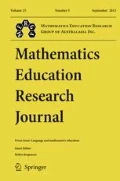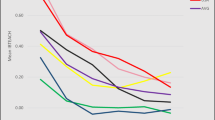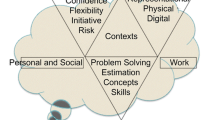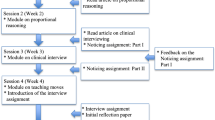Abstract
The interplay between mathematics teachers’ beliefs and practices has been widely investigated and research has examined how teachers’ beliefs about mathematics, teaching and learning change when participating in continuing professional development (CPD). In this paper, I track teachers’ self-reported beliefs and practice changes as they participate in a 1-year CPD programme intended to support them in learning to teach mathematics through inquiry (LTMI). LTMI is a blended programme that integrates two phases: summer workshops and monthly follow-up meetings held during the scholastic year. Using a case-study design, data focusing on self-reported beliefs and practices were collected, using questionnaires and interviews, from three teachers at different stages: before, during and at the end of the CPD. Results show that, following teachers’ participation in summer workshops, they reported stronger connectionist beliefs. However, by the end of the CPD, while their connectionist beliefs remained strong, teachers reported increased discovery beliefs. Discovery beliefs were consistent with their reported changes in teaching practices. It appears that, in changing from transmission to inquiry teaching, these teachers adopted a non-interventionist and non-interactionist discovery teaching approach. This finding has implications for the design of CPD and, hence, the need to offer a supportive structure that helps teachers to recognise and address the limitations of their practices, along their journey to change towards more inquiry teaching.



Similar content being viewed by others
Data availability
The full data set and coding is available online at https://figshare.com/articles/dataset/Teachers_Beliefs_and_practice_change/9891371.
Change history
03 March 2021
A Correction to this paper has been published: https://doi.org/10.1007/s13394-021-00370-1
References
Alfieri, L., Brooks, P., Aldrich, N., & Tenenbaum, H. (2011). Does discovery-based instruction enhance learning? Journal of Educational Psychology, 103(1), 1–18. https://doi.org/10.1037/a0021017.
Artigue, M., & Blomhøj, M. (2013). Conceptualising inquiry-based education in mathematics. ZDM Mathematics Education, 45(6), 797–810. https://doi.org/10.1007/s11858-013-0506-6.
Askew, M., Brown, M., Rhodes, V., Johnson, D., & William, D. (1997). Effective Teachers of Numeracy: Final report to the teacher training agency. London: King's College.
Aulls, M. W., & Shore, B. M. (2008). Inquiry in education: The conceptual foundations for research as a curricular imperative (Vol. 1). New York, NY: Routledge.
Barkatsas, A. T., & Malone, J. (2005). A typology of mathematics teachers’ beliefs about teaching and learning mathematics and instructional practices. Mathematics Education Research Journal, 17(2), 69–90. https://doi.org/10.1007/BF03217416.
Beswick, K. (2005). The beliefs/practice connection in broadly defined contexts. Mathematics Education Research Journal, 17(2), 39–68. https://doi.org/10.1007/BF03217415.
Beswick, K. (2012). Teachers’ beliefs about school mathematics and mathematicians’ mathematics and their relationship to practice. Educational Studies in Mathematics, 79, 127–147. https://doi.org/10.1007/s10649-011-9333-2.
Boaler, J. (2009). The elephant in the classroom: Helping children learn and love maths. London: Souvenir Press.
Boyatzis, R. (1998). Transforming qualitative information: Thematic analysis and code development. Thousand Oaks, CA: Sage.
Braun, V., & Clarke, V. (2006). Using thematic analysis in psychology. Qualitative Research in Psychology, 3(2), 77–101. https://doi.org/10.1191/1478088706qp063oa.
British Educational Research Association [BERA] (2018). Ethical guidelines for educational research (4th ed.). London. Retrieved from: https://www.bera.ac.uk.
Buhagiar, M. A., & Murphy, R. (2008). Teachers’ assessments of students learning of mathematics. Assessment in Education: Principles, Policy & Practice, 15(2), 169–182. https://doi.org/10.1080/09695940802164192.
Calleja, J. (2016). Teaching mathematics through inquiry: A continuing professional development programme design. Educational Designer, 3(9). http://www.educationaldesigner.org/ed/.
Calleja, J. (2018). Teacher participation in continuing professional development: Motivating factors and programme effectiveness. Malta Review of Educational Research, 12(1), 5-29. http://www.mreronline.org/issues/issue-1-june-2018/.
Calleja, J. (2019). Learning to teach mathematics through inquiry: A case study of continuing professional development in Malta. PhD Thesis. Nottingham, UK: University of Nottingham. http://eprints.nottingham.ac.uk/55835.
Cross, D. I. (2009). Alignment, cohesion, and change: Examining mathematics teachers’ belief structures and their influence on instructional practices. Journal of Mathematics Teacher Education, 12(5), 325–346. https://doi.org/10.1007/s10857-009-9120-5.
Davis, B., Towers, J., Chapman, O., Drefs, M., & Friesen, S. (2020). Exploring the relationship between mathematics teachers’ implicit associations and their enacted practices. Journal of Mathematics Teacher Education, 23, 407–428. https://doi.org/10.1007/s10857-019-09430-7.
Engeln, K., Mikelskis-Seifert, S., & Euler, M. (2014). Inquiry-based mathematics and science education across Europe: A synopsis of various approaches and their potentials. In C. Bruguière, A. Tiberghein, & P. Clément (Eds.), Topics and Trends in Current Science Education. Netherlands: Springer.
Ernest, P. (1989). The impact of beliefs on the teaching of mathematics. In P. Ernest (Ed.), Mathematics teaching: The state of the art (pp. 249–253). New York: Falmer.
Felbrich, A., Kaiser, G., & Schmotz, C. (2012). The cultural dimension of beliefs: An investigation of future primary teachers’ epistemological beliefs concerning the nature of mathematics in 15 countries. ZDM Mathematics Education, 44(3), 355–366. https://doi.org/10.1007/s11858-012-0418-x.
Graham, D. J., & Midgley, N. G. (2000). Graphical representation of particle shape using triangular diagrams: An Excel spreadsheet method. Earth Surface Processes and landforms, 25(13), 1473–1477.
Guskey, T. R. (2002). Professional development and teacher change. Teachers and Teaching: Theory and Practice, 8(3/4), 381–391. https://doi.org/10.1080/135406002100000512.
Hattie, J. (2009). Visible learning: A synthesis of over 800 meta-analyses relating to achievement. London: Routledge.
Hmelo-Silver, C. E., Duncan, R. G., & Chinn, C. A. (2007). Scaffolding and achievement in problem-based and inquiry learning: A response to Kirschner, Sweller, and Clark (2006). Educational Psychologist, 42(2), 99–107. https://doi.org/10.1080/00461520701263368.
Kirschner, P. A., Sweller, J., & Clark, R. E. (2006). Why minimal guidance during instruction does not work: An analysis of the failure of constructivist, discovery, problem-based, experiential, and inquiry-based teaching. Educational psychologist, 41(2), 75–86. https://doi.org/10.1207/s15326985ep4102_1.
Kvale, S. (1996). Interviews: An introduction to qualitative research interviewing. Thousand Oaks, CA: Sage.
Lampert, M., & Blunk, M. (1999). Talking mathematics in school: Studies of teaching and learning. Cambridge, MA: Cambridge University Press.
Lazonder, A. W., & Harmsen, R. (2016). Meta-analysis of inquiry-based learning: Effects of guidance. Review of Educational Research, 86(3), 681–718. https://doi.org/10.3102/0034654315627366.
Loucks-Horsley, S., Stiles, K., Mundry, S., Love, N., & Hewson, P. (2010). Designing professional development for teachers of science and mathematics (3rd ed.). Thousand Oaks, CA: Corwin.
Maaß, K., & Artigue, M. (2013). Implementation of inquiry-based learning in day-to-day teaching: A synthesis. ZDM Mathematics Education, 45(6), 779–795. https://doi.org/10.1007/s11858-013-0528-0.
Maaß, K., Swan, M., & Aldorf, A. M. (2017). Mathematics teachers’ beliefs about inquiry-based learning after a professional development course: An international study. Journal of Education and Training Studies, 5(9), 1–17. https://doi.org/10.11114/jets.v5i9.2556.
Mansour, N. (2009). Science teachers' beliefs and practices: Issues, implications and research agenda. International Journal of Environmental and Science Education, 4(1), 25–48. https://eric.ed.gov/?id=EJ884384
Mason, J., & Johnston-Wilder, S. (2006). Designing and Using Mathematical Tasks (2nd ed.). St Albans: Tarquin Publications.
Nathan, M. J., & Knuth, E. J. (2003). A study of whole classroom mathematical discourse and teacher change. Cognition and Instruction, 21(2), 175–207. https://doi.org/10.1207/S1532690XCI2102_03.
OECD. (2009). Creating effective teaching and learning environments: First results from TALIS. Paris: OECD.
OECD. (2019). TALIS 2018 Results (Volume I): Teachers and school leaders as lifelong learners. TALIS, OECD Publishing, Paris. https://doi.org/10.1787/1d0bc92a-en.
Pajares, M. F. (1992). Teachers’ beliefs and educational research: Cleaning up a messy construct. Review of Educational Research, 62(2), 307–332. https://doi.org/10.3102/00346543062003307.
Parveva, T., Noorani, S., Ranguelov, S., Motiejunaite, A. & Kerpanova, V. (2011). Mathematical Education in Europe: Common challenges and national policies. Brussels: EACEA. P9 Eurydice.
Patton, M. Q. (2002). Qualitative research and evaluation (3rd ed.). Thousand Oaks, CA: Sage.
Piaget, J. (1970). Structuralism. New York: Harper & Row.
Piaget, J. (1985). The equilibration of cognitive structure: The central problem of intellectual development. Chicago, IL: University of Chicago Press.
Polly, D., Wang, C., McGee, J. R., Lambert, R. G., Martin, C. S., & Pugalee, D. (2014). Examining the influence of a curriculum-based elementary mathematics professional development program. Journal of Research in Childhood Education, 28(3), 327–343. https://doi.org/10.1080/02568543.2014.913276.
Putnam, R. T., & Borko, H. (2000). What do new views of knowledge and thinking have to say about research on teacher learning? Educational Researcher, 29(1), 4–15. https://doi.org/10.3102/0013189X029001004.
Schoenfeld, A. H. (1985). Mathematical problem solving. Orlando, FL: Academic Press.
Schoenfeld, A. H. (2013). Classroom observations in theory and practice. ZDM Mathematics Education, 45(4), 607–621. https://doi.org/10.1007/s11858-012-0483-1.
Skemp, R. (1986). The psychology of learning mathematics. New York: Penguin.
Skott, J. (2015). The promises, problems, and prospects of research on teachers’ beliefs. In H. Fives & M. G. Gill (Eds.), International handbook on teachers’ beliefs (pp. 13–30). New York: Routledge.
Smith, M. S. (2001). Practice-based professional development for teachers of mathematics. Reston, VA: National Council of Teachers of Mathematics.
Swain, J., & Swan, M. (2007). Thinking through mathematics. London: NRDC.
Swan, M. (2006). Collaborative Learning in Mathematics: A challenge to our beliefs and practices. London, England: National Institute for Advanced and Continuing Education (NIACE) National Research and Development Centre for Adult Literacy and Numeracy (NRDC).
Swan, M., & Swain, J. (2010). The impact of a professional development programme on the practices and beliefs of numeracy teachers. Journal of Further and Higher Education, 34(2), 165–177. https://doi.org/10.1080/03098771003695445.
Thompson, A. G. (1992). Teachers’ beliefs and conceptions: A synthesis of the research. In D. A. Grouws (Ed.), Handbook of Research on Mathematics Teaching and Learning (pp. 127–146). New York: Macmillan.
Tuan, H. L., Yu, C. C., & Chin, C. C. (2017). Investigating the influence of a mixed face-to-face and website professional development course on the inquiry-based conceptions of high school science and mathematics teachers. International Journal of Science and Mathematics Education, 15(8), 1385–1401. https://doi.org/10.1007/s10763-016-9747-5.
Voss, T., Kleickmann, T., Kunter, M., & Hachfeld, A. (2013). Mathematics teachers’ beliefs. In Cognitive activation in the mathematics classroom and professional competence of teachers (pp. 249–271). Springer, Boston, MA.
Vygotsky, L. (1978). Mind in society. Cambridge, MA: Harvard University Press.
Wenger, E. (1998). Communities of practice: Learning, meaning and identity. Cambridge, MA: Cambridge University Press.
Wilson, S., & Cooney, T. (2002). Mathematics teacher change and development. In G. Leder, E. Pehkonen, & G. Torner (Eds.), Beliefs: A hidden variable in mathematics education? (pp. 127–147). Dordrecht: Kluwer.
Yin, R. K. (2003). Case study research: Design and methods. Thousand Oaks, CA: SAGE Publications.
Yurekli, B., Stein, M. K., Correnti, R., & Kisa, Z. (2020). Teaching mathematics for conceptual understanding: Teachers’ beliefs and practices and the role of constraints. Journal for Research in Mathematics Education, 51(2), 234–247. https://doi.org/10.5951/jresematheduc-2020-0021.
Acknowledgements
I would also like to thank the teachers taking part in this research. Due gratitude goes to the late Prof Malcolm Swan and Prof Jeremy Hodgen for their continuous support and insights, and to Dr. Colin Foster for his guidance during this research and valuable comments provided on earlier drafts of this paper.
Author information
Authors and Affiliations
Corresponding author
Additional information
Publisher’s Note
Springer Nature remains neutral with regard to jurisdictional claims in published maps and institutional affiliations.
Appendices
Appendix 1. Belief statements
You are presented with three statements about mathematics, learning and teaching.
For each statement, give a percentage (%), so that the three percentages in each section add up to a 100.

Appendix 2. Sample pen portrait
Chris: Pen portrait prior to his participation in CPD
His self-reported practices and beliefs
My explanations are clearly delivered and include questions directed at individual students. I keep introductions short and do not waste much time on ideas that are ‘out’ of the syllabus. I only ask a few questions and then provide extended periods where students work on exercises from the textbook or a worksheet. The exercises I assign start with a few easy questions and then gradually move to harder examples. I set students working and deal with student difficulties individually while I go around the class. When students are working, I prefer to tell students where they have gone wrong and show them where and how to correct mistakes. I stop the class from time to time to clarify questions that I identify as particularly difficult because it is useful to discuss errors and alternative methods.
I have a formal, yet cheerful and positive relationship with students. I make sure to get to know my students and try to establish a relationship with them first. I feel that the students in my class need to be motivated and prompted all the time. I am not too hard on them. My students seem to like to be organised and prefer to be told what to do. Students have the idea that mathematics is about working lots of problems from the textbook and trying to get as many of them correct as possible.
I believe that students learn best when their own ideas are discussed and investigated, but there is little evidence of this in my classroom. Although I believe that it is more important for students to develop conceptual understanding rather than computational skills, I find it very difficult to do because of many constraints. I feel much pressure to ‘cover’ the syllabus and I want to make sure that students do well in their exams. I feel constrained and frustrated by the scheme of work. I also claim that overloaded syllabi, high-stakes examinations and pressure from parents are constraints that I find hard to overcome.
His typical sequence of classroom actions
-
1.
Provide notes
-
2.
Give an explanation
-
3.
Pose oral questions to the students
-
4.
Devote time for student questioning
-
5.
Give an easy question
-
6.
Demonstrate examples
-
7.
Give a challenging question
-
8.
Assign work to be done individually
Mean percentage weighting on his beliefs statements
Transmission—42%
Discovery—33%
Connectionist—25%
Rights and permissions
About this article
Cite this article
Calleja, J. Changes in mathematics teachers’ self-reported beliefs and practices over the course of a blended continuing professional development programme. Math Ed Res J 34, 835–861 (2022). https://doi.org/10.1007/s13394-021-00366-x
Received:
Revised:
Accepted:
Published:
Issue Date:
DOI: https://doi.org/10.1007/s13394-021-00366-x




